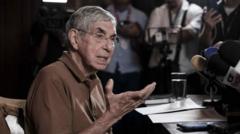Former President of Costa Rica and Nobel Peace Prize recipient, Oscar Arias, has revealed that his US visa has been revoked, a decision he believes may be politically motivated. The 84-year-old stated that he received notice of the cancellation weeks after making critical remarks about President Donald Trump, stating the President’s conduct resembles that of a Roman emperor.
In a press conference held in San José, Arias expressed confusion over the revocation, stating he received a brief email from US authorities without any specified reasons. He hinted that the decision could stem from his past efforts to build relations with China during his presidency from 2006 to 2010, notably when he established diplomatic ties with China and severed relations with Taiwan.
Although he does not think the decision originated directly from Trump, he suggests that it may have been the US State Department that made the final call. Arias emphasized that Costa Rica has historically maintained sovereignty and avoided acting on US directives, unlike many smaller nations.
Further complicating relations, the Trump administration has expressed disapproval of growing Chinese influence in Central America, while currently supporting President Rodrigo Chaves for his actions to restrict Chinese companies' participation in Costa Rica's 5G network development.
This pattern is not isolated, as three members of the Costa Rican national assembly opposing the exclusion of Chinese firms have likewise seen their US visas revoked. The implications of Arias's situation bring to light a wider controversy surrounding US foreign relations and political dissent, underscoring the tensions within Central American diplomacy.





















